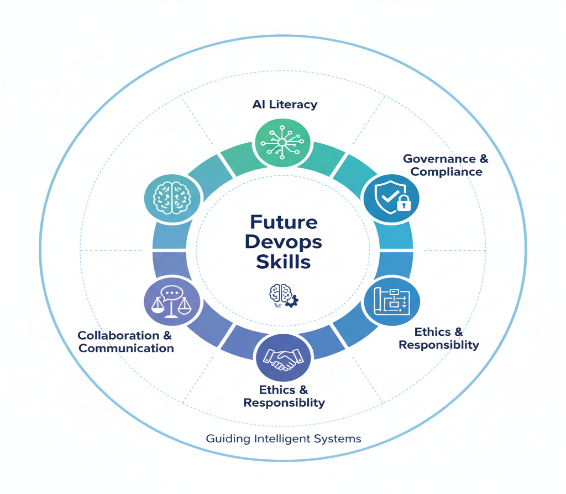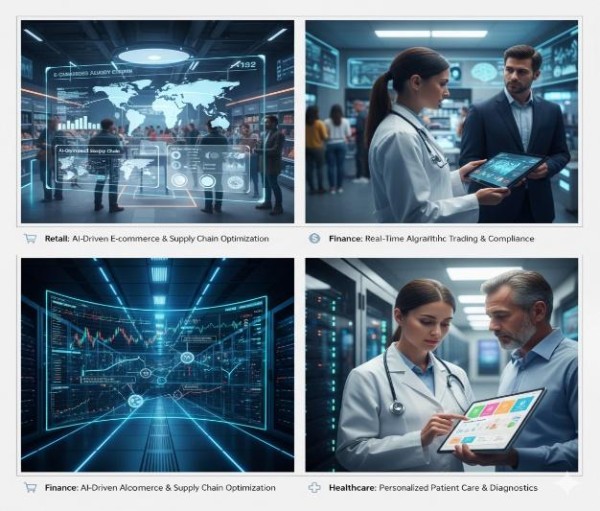DevOps Roles of the Future: From Engineers to AI-Powered Orchestrators
Developers who bridge the gap between technology creation and operations are those who have conceptualizing Automation for years. They coordinated incident response, administered infrastructure, and created automation workflows. However, a new trend is emerging as digital complexity and system size increase: AI-driven orchestration.
An increasing number of administration duties are being performed by machines with intelligence in place of manually creating procedures or deciphering endless dashboards. AI is becoming a co-pilot in DevOps, helping with every task from installation administration and transparency management to rollbacks during failures. According to experts, this will alter engineers’ roles rather than entirely replace them.
The Growing Roles of DevOps Professionals
Development operations professionals today administer data collection technologies like Splunk and Prometheus as well as cloud infrastructure technologies like Terraform and Kubernetes, and pipelines for Continuous Integration/Continuous Delivery. However, the concept mostly depends on human oversight, which is not sustainable in microservices ecosystems and globally distributed cloud platforms.
Artificial Intelligence has an opportunity for closing that distance. With greater speed than human beings think, massive language models and agent-based AI systems can correlate signals, identify anomalies, and recommend measures to correct them. In response, engineers are going to concentrate more on strategy while concentrating fewer on implementation.
From Performers to Conductors
Professionals have been assigned as administrators in the developing model:
- Clearly communicating intentions by means of the development safeguarding guidelines, compliance regulations, and performance targets.
- Keeping track of artificial intelligence’s performance as self-regulating agents that modify implementations or address problems.
- Improving systems through the incorporation of new artificial intelligence (AI) capabilities and model refinement.
According to this theory, engineers act as sophisticated systems that navigate the turbulent environments associated with modern infrastructure, reminiscent of air traffic control personnel.
Skills Required for the Artificial Intelligence Age
For those looking to properly understand both the benefits and drawbacks of AIOps and LLMs, future professionals in DevOps will need the following skills: • AI literacy.
- Knowledge of policies and procedures that will ensure AI operates anonymously.
- Having the capacity to create technologies that strike a harmonious equilibrium between automation and human control.
- Responsible management to make sure AI choices meet legal and corporate requirements.
- Cross-disciplinary cooperation between executives from companies and data specialists.

Figure 1: Important Qualifications for the Upcoming AI-Based DevOps Specialist
Opportunities and pitfalls
contemporaneous information capture, enhanced reliability, and more quickly implementations are all within reach with artificial intelligence-powered management. Still, there are still issues to be resolved, such as fostering modifications in culture, preventing over-reliance, addressing shortages of talent, and fostering trust in artificial intelligence deliverables.
Reproduction in the Real World
A number of industries are currently implementing investigations:
- Retail: artificial intelligence autonomously scales ensembles and tracks consumption explosions during peak sales periods.
- Finance: artificial intelligence can recognize irregularities in transaction systems’ microsecond-level retardation.
- Medical: artificial intelligence correlates cloud service provider logs with the patient website metrics for guaranteed uptime.
Humans are still in command in every situation, directing strategy while AI manages execution.

Figure 2: Examples of Transfers in the Real World: AI-Based Control in Finance and Retail
The Road That Lies in the Future
Artificial intelligence experts, fresh positions like an ethical artificial intelligence Operational Supervisor, Observation Coordinator, and AI Operational Engineer will become mainstream by in the year 2030. Organizations that use artificial intelligence-based orchestration will become more efficient and tolerant, whereas those that stick with manual procedures risk falling behind.
Therefore, the development organization’s future does not lie in substituting machines for humans. In an ecosystem that never stops working, engineers are becoming orchestrators of intelligent systems, negotiating the delicate border between human intention and machine execution.
Author’s Bio

Venkat Rama Raju Alluri has spearheaded digital transformation projects at Oracle, Novartis, and J. Crew. He has extensive knowledge of cloud operations, Kubernetes-based GitOps, Amazon Web Services (AWS), and AI-driven DevOps platforms. He also specialises in multi-region disaster recovery and enterprise automation.
In addition to his technical leadership, Alluri is a well-known author and contributor on blockchain security, artificial intelligence, and operational automation. Among his projects are AI-powered log inspection systems and generative AI retail solutions. Acknowledged for fusing strategic vision with cutting-edge technical expertise, he continues to influence enterprise innovation and cloud adoption in the future.
Company Details
Organization: Coneberry
Contact Person: Vijay
Website: https://coneberry.com/
Email: Send Email
Country: United States
Release Id: 11112536774
